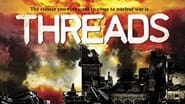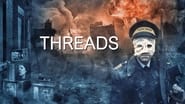Scott LeBrun
The year after the U.S.A. aired 'The Day After', England followed suit with this BBC movie that details the chilling after-effects of a nuclear strike.America and Russia get locked into an escalating battle that ends with a series of nuclear attacks, and the working-class English city of Sheffield is one of those burgs that are victimized. The story is personalized by focusing on a young couple, Jimmy (Reece Dinsdale) and Ruth (Karen Meagher), who are expecting a child and decide to get married. But they are never able to realize their plans."Sobering" doesn't begin to describe 'Threads'. It's one of the most gut-punching, honest, believable, and gloomy tales to touch upon the subject of living in a post-holocaust world. In the hands of writer Barry Hines and producer / director Mick Jackson (who went on to make Hollywood movies such as "Volcano" and "The Bodyguard"), there is no room for melodrama here. Everything is played in a strict matter-of-fact fashion. And the devastation that we witness here makes for an interesting sort of entertainment. One doesn't really "enjoy" it, but it's as fascinating as it is bleak. Part of the impact comes from a documentary-style approach, with a narrator (Paul Vaughan) who is heard on a fairly regular basis. We see many victims struggling mightily to survive, and doing whatever they have to do. We are also shown the efforts of emergency personnel to deal with this untenable situation, and given all pertinent scientific facts (giving 'Threads' a bit of an edge over 'The Day After').Ruth remains a focal point as we are taken on this sombre journey. The movie is also a real triumph in production design, atmosphere, and gritty cinematography. It doesn't go overboard in covering actors in grotesque makeup in order to make its point; here, a little goes a long, long way.'Threads' is the kind of experience that doesn't leave one unaffected.10 out of 10.
WubsTheFadger
Short and Simple Review by WubsTheFadgerThreads depicts a world were nuclear war has really happened. It handles the subject with extreme care and realism. The story is brutal, gory, and horrifying. The last hour is very scary and intense. The ending scene is terrifying.The acting is okay. The acting is very dated but most of the actors hold their own.The pacing is very slow until the bombs are dropped (about an hour into the film). The runtime is overlong.The brutality shown in this film is very realistic and might frighten some people.Pros: Brutal, gory, and horrific story, the ending scene, and the realistic depiction of nuclear falloutCons: Outdated acting, slow pacing in the beginning, and an overlong runtimeOverall Rating: 7.8
Chris_Lacon
It's a true testament to a films impact and power, when its narrative and its images stay with you for years or even decades after its release. It's even more impressive when a television movie, often resigned as cinema's lesser equivalent, manages that same feat despite lower budgets and lesser known stars. "Threads" shot on a shoestring budget of between £250 to 350,000 and first broadcast on 24th September 1984, is one of the few television films that transcends its medium and in many ways, surpasses even cinematic features in its depiction of apocalyptic events. It also say's a considerable amount when, despite relatively few repeats, it's visceral, grotesque images still stay with its viewers more than three decades after its original broadcast."Threads" similarly to its American predecessor "The Day After", released a year before, depicts the events leading up to, during and after a Soviet-American nuclear war and the resulting social, medical and psychological breakdown of society. Unlike "The Day After", which shows up to a few weeks after the nuclear exchange, "Threads" shows what would happen 10 years following the attacks, allowing for a greater perspective on the aftermath. That, in my opinion, is why "Threads" packs a far harder punch than "The Day After" which, whist harrowing in its own way, has a more definitive end: with "Threads" the horror never ends.Key to the film's power is the way the director, Mick Jackson, approaches the material. More kitchen sink drama then disaster movie, "Threads" was written by Barry Hines, author and screenwriter of the excellent "Kes". Jackson gives "Threads" a similar approach to the latter, portraying realistic, ordinary characters caught up in events far beyond their control. There are no scenes depicting Soviet and American generals bickering and blustering, instead, the political and military drama takes a backseat to the human drama. What we have instead, is an everyday scenario regarding an unplanned pregnancy, between two people from different social classes in Sheffield. A subplot details the bureaucratic and ultimately futile plans of a group of civil servants to keep the country running, should war break out. We are kept informed of escalating events between Russia and the United States via scant news reports, scattered radio broadcasts and a clipped, almost matter of fact narration from Paul Vaughan. There are no massive action set pieces showing cities being vaporised: instead inter-titles showing figures and statistics, clinically describe the worlds decent into nuclear holocaust.Cast wise, "Threads" is, for the large part, devoid of household names, unlike "The Day After" which counts Jason Robards and John Lithgow among its cast. Here, the cast is comprised of mostly unknown actors, adding to the strong sense of realism. Few of the actors are household names, so their performances here are not tainted by their over familiar faces or associations with any other roles. Instead, the actor's anonymity helps the audience immerse themselves in the story and relate to the characters more. Following the attack scenes, several characters are never seen again, effectively putting us in the remaining characters shoes: they don't know what's happened to their loved ones and neither do we.Ultimately, what makes "Threads" stand out among its contemporaries, are its true commitment to both realism and showing the audience the true, terrifying aftermath of nuclear war. The film shows us, in almost unbearable detail, the graphic and rapid deterioration of humanity once the bombs drop and the fallout descends. . Ironically despite the films subject matter there are comparatively few gruesome scenes, even the stomach churning hospital scene is shot and edited in such a chaotic, fleeting way that it leaves more of a psychological impact then a visceral one and shots of burned corpses are brief. The film's horror instead lies, not in graphic shots of dead and disfigured bodies, but in showing the complete and total breakdown of social order and how quickly the "threads" of society become severed. The majority of the films disturbing imagery is depicted in the third act of the story, depicting ten years after the attacks. What used to be Sheffield is now a burned out wasteland, inhabited by a dwindling population of sick, starving and blind survivors trying vainly to eke out an existence from the poisoned soil. The few children born since the war are illiterate, feral and barely capable of speaking English due to the nonexistent education system. The most horrific image that the film conjures up is its final one: due to years of radiation exposure, the next generation are stillborn and deformed and any lingering hope that the viewer had for a happy ending is brought crashing down.For all the praise I've heaped on the film thus far, "Threads" does have a few, comparatively minor flaws. Some of the characters feel somewhat underdeveloped, although this could be overlooked, as due to the films style and commitment to realism giving the characters Hollywood style story arcs would have been jarring with the films tone. Secondly, due to the time and political climate when the film was made, it is perhaps unsurprising that the film is by now very dated, however again this can be overlooked as the films raw power overrides the films dated look. Indeed the films gritty, grainy stock really helps convey the squalor of the post war world.Overall, "Threads" is a true television masterpiece that far surpasses the "The Day After" and the rest of its contemporaries. Powerful, hard hitting and thought provoking, "Threads" is guaranteed to linger in the mind long after it's over. Overcoming its minuscule budget and dedicated to showing the true face of nuclear war in all its grotesque, nightmarish realism, Mick Jackson delivers a truly terrifying glimpse into a world that could have been, could still be and must never be.
Andy B
When I was a kid in the 1970s, I was terrified of the prospect of nuclear war. The long Cold War years stretched on, and as a young teen, circa 1978, I decided I had to get on with living - or go nuts. This I did and so was largely unmoved by Threads. Which sounds dreadful, but that's the way it was. Ever since Ronald Reagan had been elected as American President in 1980, the left wing press and the dear old leftie BBC (which has never obeyed the impartiality clause of its charter) had been bigging up the terror even more. And Threads was another example of that. Fortunately, Gorbachev arrived in 1985, and the Cold War ice melted rapidly. The second half of the 1980s was nothing like the fearful 70s or early 80s. Of course, being a leftie myself, I had my doubts when Thatcher declared Gorbachev was a man we could do business with, but capitalism was certainly better than incineration. Threads is a dreadful drama that all lefties profess to remember and to say summed up the fears of the entire decade. Nonsense. Remember Gorbachev. Read the newspapers of 1985-1989. Remember reality. The Cold War was over well before the Soviet Union crumbled. In fact, Gorbachev himself stated that it formally ended in late 1989. And the four years leading up to that were certainly nothing like what had gone before.




